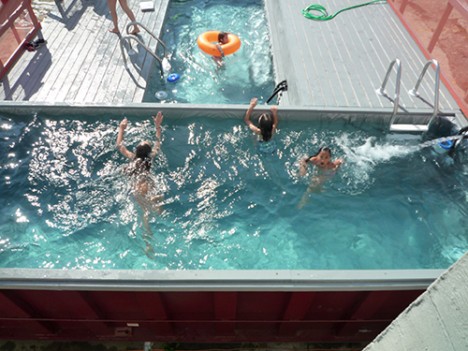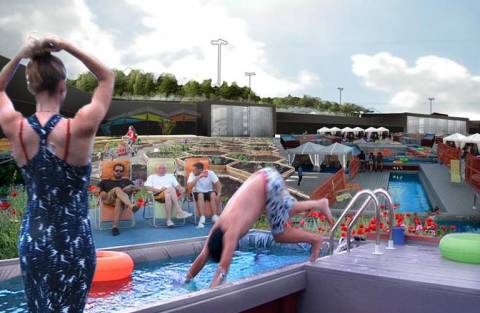
Looks like we can add this to the list of StuffWhitePeopleLike.com
A Cleaner Kind of Dumpster Diving
Nothing’s cooler than repurposing unused industrial stuff, except maybe a summertime dip in a swimming pool with your friends. If your friends know the right people, you can indulge both impulses at the same time in one of Brooklyn’s Dumpster pools. Though located in a chained-off hipster enclave in Greenpoint, near the semi-toxic Gowanus canal, the New York Times reports that the pools are spreading … to strip mall parking lots?

As ReadyMade first reported a couple of weeks ago, the idea began in Athens, Georgia. Jocko Weyland, a skater and author, discovered some Dumpster pools made by Curtis Crowe of the band Pylon. The pools have a few years’ history at a smaller scale, and Jocko decided to try them in the wilds of Brooklyn.
He and friends formed a company, Macro-Sea, and, with volunteers, a couple thousand dollars and the donation of roll-off Dumpster, they managed to set up everything in 12 days.
To make it a pool, they sealed the seams, added a liner, filled the bottom with sand, rounded down the interior edges, added a filter, thousands of gallons of water. All that was left was a discreet invite to a few dozen people.
The floodgates were open. Word spread through the blogosphere, and everyone wanted to know where the hot cool pool was. (Its location, at the corner of Carroll and Bond Street, just a block from the Gowanus Canal, was revealed by the Daily News.)
Despite attempts by crashers and curious DIYers, the pool parties will nevertheless remain the province of a chosen few hipster artists and their ilk.

Taking The Dumpster Pools on the Road
Ultimately, fortunately, this isn’t meant to be an elite fad. The Gowanus pools are only the tip of the iceberg. Macro-Sea intends to roll out their roll-off Dumpster idea to underused strip mall parking lots across the country, turning eyesores into vibrant, indie community destinations.
David Belt, a real estate developer and the president of Macro-Sea, described his idea to Melissa Ryzik of the Times.
“I thought if we could get people to come here and swim in a Dumpster, I could probably use the same aesthetic sensibility” to get people — and, not incidentally, better retailers — to come to a dingy strip mall, Mr. Belt said. The company hopes to open its first repurposed shopping center in Atlanta this fall, ideally with dozens of pools in the parking lot that visitors can rent for the day.
Why Strip Malls
Until the strip mall goes away, the idea sounds great. The strip mall is an idea that never made much sense, much money, or much community. Their two-story stores have helped generate sprawl and provided a useful symbol for the sense of suburban mediocrity that followed.
But, like disused big box stores, old strip malls also provide a lot of versatile, potentially useful open space. As many strip malls fall pray to the economic crisis, repurposing them, as at least one competition tried to encourage last year, is shifting from idea to reality.
The idea of taking Dumpster pools, along with cabanas, umbrellas and grilles, into strip mall parking lots sounds good at first. But on second thought, placing pools in such places, with their amorphous shape, sprawling scale, empty feel and mind-numbing visual pollution, could amount to little more than novelty — a well-intentioned one, but a potentially unappealing one.
The Strip Farm: Could It Work in Atlanta
Good thing then that Macro-Sea, in collaboration with Vamos Architects, isn’t stopping at Dumpster pools. They envision the pools as one part of strip mall community centers, with green space, skate parks, ampitheaters and other structural or landscape changes to encourage community, like the Strip Farm, below.
Still unclear is how “better retailers” will fit into such revived strip malls, and what kind of response local communities might have. In Brooklyn, chock-a-block with sunglassed hipsters looking for creative alternatives to the air conditioner, a Dumpster pool party has an undeniable cool factor (being secret and exclusive also helps). But how will that idea translate on the swelteringly hot asphalt of a very public suburban strip mall in Georgia?
Presumably, if done well, the plan could redefine the entire relationship locals have with these otherwise unexciting public spaces. If not, at least some valuable lessons might be learned.
We’ll be watching with interest how Macro-Sea manages to do with a strip mall in Atlanta what they’ve done with a few Dumpsters in Brooklyn. They’ve made a splash. Let’s hope they make some waves.
Leave a Comment!